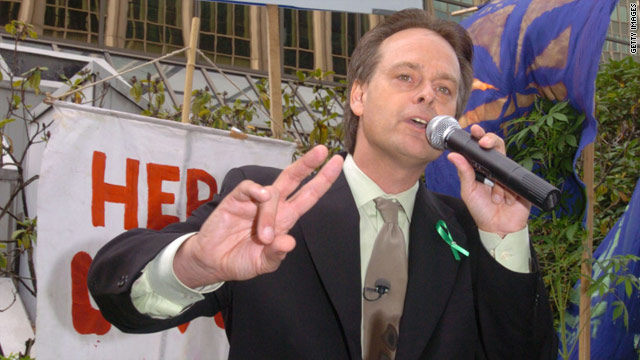

Marijuana activist Marc Emery pleaded guilty in U.S. District Court in Seattle, Washington, to a single count of conspiracy to manufacture marijuana following an 18-month investigation into the seed-selling business Emery operated from his head shop in Vancouver, British Columbia.
U.S. District Court Judge Ricardo Martinez scheduled Emery's sentencing August 27. At that time, the judge has the choice of accepting or rejecting the plea agreement, said Emery's Seattle-based attorney, Richard Troberman.
"Based on comments the court has made. I have every reason to believe he will follow the plea agreement," Troberman told CNN.
Emery, 52, was brought to the United States last week. Canada's justice minister signed an extradition order May 10 that left the outspoken libertarian with little choice after years of fighting extradition.
"Marc has never been afraid to face the music," said Emery's wife, Jodie. "He's spent most of his life breaking laws he considers unjust to demonstrate they're unjust. He'll go to jail to prove how absurd our drug laws are."
The plea comes nearly five years after Emery was arrested in Halifax, Nova Scotia, where he says he was the guest speaker at the Maritimers Unite for Medical Marijuana festival. He was accused of selling marijuana seeds to customers in the United States.
The same day, Emery wrote on his website, DEA agents raided his head shop in downtown Vancouver, where he sold bongs, pipes and books. He also produced the magazine Cannabis Culture and ran an Internet portal, Pot-TV.
Investigators also traced his product to illegal growing operations in several states, the U.S. Attorney's Office said in a July 2005 news release.
A statement issued by the DEA in 2005 after Emery's arrest suggested that he was targeted for his activism, with DEA Administrator Karen Tandy touting his capture as a "significant blow not only to the marijuana trafficking trade in the United States and Canada, but also to the marijuana legalization movement."
Tandy described Emery as one of 46 of the U.S. attorney general's most wanted international drug traffickers and the only one from Canada, with his "marijuana trade and propagandist marijuana magazine" generating nearly $5 million in profits.
Emery and two of his employees were each charged with conspiracy to distribute marijuana, conspiracy to distribute marijuana seeds and conspiracy to lauder money, charges that carry penalties of 10 years to life in prison. After years of legal wrangling with Canadian and U.S. authorities, Emery reached the plea deal on the lesser charge, Troberman said.
Co-defendants Gregory Williams and Michelle Rainey-Fenkarek entered pleas this year to lesser offenses and were placed on probation in Canada, according to court documents. They were never brought to the United States.
"This prosecution has to do with his criminal activities and has nothing to do with his political activism," said Emily Langlie, spokeswoman for the U.S. Attorney's Office. Langlie added that she could not comment on the 2005 DEA statement.
Emery summed up his raison d'etre in a lengthy article published in Cannabis Culture and online after his arrest. He described his thoughts at the moment he was handcuffed: "Every seed sold, all the millions of dollars I had given to the cause, every speech to free our people, every arrest, jailing and raid I had endured: it was all for this moment in time."
iReport: "Prince of Pot" speaks
Much like in the United States, distribution and trafficking carry heavier punishments: a maximum of seven years for conspiracy to manufacture marijuana and a maximum sentence of life imprisonment for conspiracy to traffic in marijuana, according to a spokeswoman for Department of Justice Canada.
In practice, Canadian judges rarely mete out sentences longer than two years plus fines, based on a policy of judicial guidance that calls for incarceration as the last resort, according to several criminal defense lawyers and drug policy experts.
"Sentences typically don't reach the mandatory minimums that are in place in U.S. federal system," Vancouver defense lawyer Kirk Tousaw said. He is Emery's legal counsel in Canada, a contributor to his magazine and attorney for his co-defendants.
Extradition to the United States, however, is commonplace in cases of Canadians accused of selling or smuggling drugs in the United States, said Troberman, Emery's Seattle-based attorney. He has represented many Canadians in the United States.
"The only thing that makes this case somewhat unusual is that Marc was very visible and open about everything he did, and the Canadians had no interest in prosecuting him," Troberman said. "It was the U.S. who stepped in and put pressure on Canada."
http://www.cnn.com/2010/CRIME/05/24/washington.emery.pot.plea/index.html?iref=allsearch








No comments:
Post a Comment